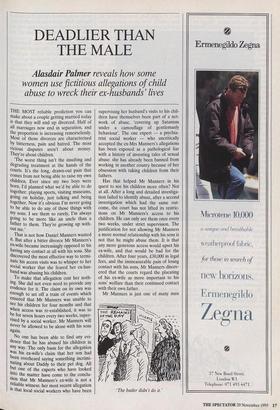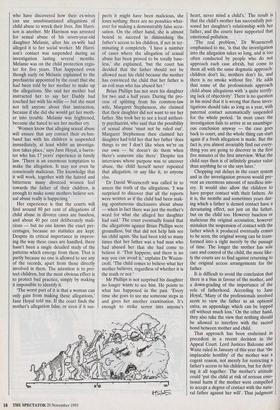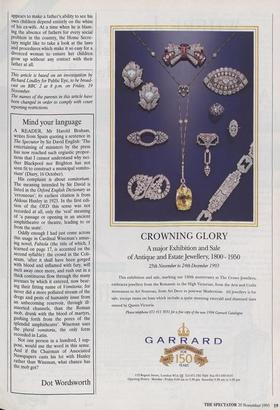DEADLIER THAN THE MALE
Alasdair Palmer reveals how some
women use fictitious allegations of child abuse to wreck their ex-husbands' lives
THE MOST reliable prediction you can make about a couple getting married today is that they will end up divorced. Half of all marriages now end in separation, and the proportion is increasing remorselessly. Most of those divorces are characterised by bitterness, pain and hatred. The most vicious disputes aren't about money. They're about children.
`The worst thing isn't the insulting and degrading treatment at the hands of the courts. It's the long, drawn-out pain that comes from not being able to raise my own children. Ever since my two boys were born, I'd planned what we'd be able to do together: playing sports, visiting museums, going on holiday, just talking and being together. Now it's obvious I'm never going to be able to do any of those things with my sons. I see them so rarely, I'm always going to be more like an uncle than a father to them. They're growing up with- out me.'
That is not how Daniel Manners wanted it- But after a bitter divorce Mr Manners's ex-wife became increasingly opposed to his having any contact at all with his sons. She discovered the most effective way to termi- nate his access visits was to whisper to her social worker that she feared her ex-hus- band was abusing his children. To make that allegation cost her noth- ing. She did not even need to provide any evidence for it. The claim on its own was enough to set off a train of events which ensured that Mr Manners was unable to see his children for four months and that when access was re-established, it was to be for seven hours every two weeks, super- vised by a social worker. Mr Manners will never be allowed to be alone with his sons again.
No one has been able to find any evi- dence that he has abused his children in any way. The only basis for the allegation was his ex-wife's claim that her son had been overheard saying something incrimi- nating about Daddy to their pet dog. All but one of the experts who have looked into the matter have come to the conclu- sion that Mr Manners's ex-wife is not a reliable witness: her most recent allegation is that local social workers who have been supervising her husband's visits to his chil- dren have themselves been part of a net- work of abuse, 'covering up Satanism under a camouflage of gentlemanly behaviour'. The one expert — a psychia- trist social worker — who uncritically accepted the ex-Mrs Manners's allegations has been exposed as a pathological liar with a history of inventing tales of sexual abuse: she has already been banned from working in another county because of her obsession with taking children from their fathers.
Has that helped Mr Manners in his quest to see his children more often? Not at all. After a long and detailed investiga- tion failed to identify abuse, after a second investigation which had the same out- come, the court has not lifted its restric- tions on Mr Manners's access to his children. He can only see them once every two weeks, under strict supervision. The justification for not allowing Mr Manners a more normal relationship with his sons is not that he might abuse them. It is that any more generous access would upset his ex-wife, and that would be bad for the children. After four years, £30,000 in legal fees, and the immeasurable pain of losing contact with his sons, Mr Manners discov- ered that the courts regard the placating of his ex-wife as more important to his sons' welfare than their continued contact with their own father.
Mr Manners is just one of many men The butler didn't do it.' who have discovered how their ex-wives can use unsubstantiated allegations of child abuse to wreck their lives. Jim Harri- son is another. Mr Harrison was arrested for sexual abuse of his seven-year-old daughter Melanie, after his ex-wife had alleged it to her social worker. Mr Harri- son's contact was suspended during an investigation lasting several months. Melanie was on the child protection regis- ter for five years. That happened even though early on Melanie explained to the psychiatrist appointed by the court that she had been told by her mother to make up the allegations. She said her mother had instructed her to say her Daddy had touched her with his willie — but she must not tell anyone about that instruction, because if she did she would get her moth- er into trouble. Melanie was frightened, because she hated to see her mother cry.
`Women know that alleging sexual abuse will ensure that any contact their ex-hus- band has with his children is suspended immediately, at least whilst an investiga- tion takes place,' says Jane Hoyal, a barris- ter who has 17 years' experience in family law. 'There is an enormous temptation to make the allegation. It may not even be consciously malicious. The knowledge that it will work, together with the hatred and bitterness many divorced women feel towards the father of their children, is enough to make some mothers believe sex- ual abuse really is happening.'
Her experience is that the courts will find around 80 per cent of allegations of child abuse in divorce cases are baseless, and about 40 per cent deliberately mali- cious — but no one knows the exact per- centages, because no statistics are kept. Despite its critical importance in improv- ing the way these cases are handled, there hasn't been a single detailed study of the patterns which emerge from them. That is partly because no one is allowed to see any of the records, apart from those directly involved in them. The intention is to pro- tect children, but the most obvious effect is to protect bad practice, simply by making it impossible to identify it.
`The worst part of it is that a woman can only gain from making these allegations,' Jane Hoyal told me. If the court finds the mother's allegation false, or even if it sus- pects it might have been malicious, she loses nothing: there are no penalties what- ever for making a demonstrably false accu- sation. On the other hand, she is almost bound to succeed in diminishing the father's access to his children, if not in ter- minating it completely. 'I have a number of cases where the allegation of sexual abuse has been proved to be totally base- less,' she explained, `but the court has decided that the father should not be allowed near his child because the mother has convinced the child that her father is an evil man who has abused her.'
Brian Phillips has not seen his daughter for two and a half years. During the pro- cess of splitting from his common-law wife, Margaret Stephenson, she claimed that their daughter did not want to see her father. She took her to see a local authori- ty psychiatrist, who said that the possibility of sexual abuse 'must not be ruled out'. Margaret Stephenson then claimed her daughter had told her that her father 'does things to me I don't like when we're on our own — he doesn't do them when there's someone else there'. Despite ten interviews whose purpose was to uncover abuse, the child herself never repeated that allegation, or any like it, to anyone else.
Dr David Wozencroft was called in to assess the truth of the allegations. was surprised to discover that all the reports were written as if the child had been mak- ing spontaneous disclosures about abuse — when in fact there was just the mother's word for what she alleged her daughter had said.' The court eventually found that the allegations against Brian Phillips were groundless, but that did not help him see his child again. She had been told so many times that her father was a bad man who had abused her that she had come to believe it. 'That happens, and there is no way you can avoid it,' explains Dr Wozen- croft. 'The child comes to believe what her mother believes, regardless of whether it is the truth or not.'
Mr Phillips is not surprised his daughter no longer wants to see him. He points to what has happened in the past. 'Every time she goes to see me someone steps in and gives her another examination. It's enough to strike terror into anyone's heart, never mind a child's.' The result is that the child's mother has successfully poi- soned her daughter's relationship with her father, and the courts have supported that emotional pollution.
`The real problem,' Dr Wozencroft emphasised to me, 'is that the investigation into the allegation takes so long, and is too often conducted by people who do not approach each case afresh, but come to them all with the same dogmatic approach: children don't lie, mothers don't lie, and there is no smoke without fire.' He adds that some of the professionals approach child abuse allegations with 'a quite terrify- ing lack of objectivity'. There is no question in his mind that it is wrong that these inves- tigations should take as long as a year, with paternal contact automatically suspended for the whole period. 'In most cases the investigation fails to arrive at an unambigu- ous conclusion anyway — the case goes back to court, and the whole thing can start again if a fresh allegation is made. But the fact is, you almost invariably find out every- thing you are going to discover in the first five minutes of the first interview. What the child says then is of infinitely greater value than anything he or she says later.'
Chopping out delays in the court system and in the investigation process would pre- vent an enormous amount of needless mis- ery. It would also allow the children to have proper contact with their fathers. As it is, the months and sometimes years dur- ing which a father is denied contact have a devastating effect, not just on the father, but on the child too. However baseless or malicious the original accusation, however mistaken the suspension of contact with the father which it produced eventually comes to be seen, the original wrong can be trans- formed into a right merely by the passage of time. The longer the mother has sole care and control of the child, the more like- ly the courts are to find against returning to the original access arrangements for the father.
It is difficult to avoid the conclusion that there is a bias in favour of the mother, and a down-grading of the importance of the role of fatherhood. According to Jane Hoyal, 'Many of the professionals involved seem to view the father as an optional extra, an appendage which can be lopped off without much loss.' On the other hand, they also take the view that nothing should be allowed to interfere with the sacred bond between mother and child.
That approach has been enshrined in precedent in a recent decision in the Appeal Court. Lord Justices Balcome and Waite ruled in January of this year that 'the implacable hostility' of the mother was a cogent reason, not merely for restricting a father's access to his children, but for deny- ing it all together. The mother's attitude could 'put the child at risk of serious emo- tional harm if the mother were compelled to accept a degree of contact with the natu- ral father against her will'. That judgment appears to make a father's ability to see his own children depend entirely on the whim of his ex-wife. At a time when he is blam- ing the absence of fathers for every social problem in the country, the Home Secre- tary might like to take a look at the laws and procedures which make it so easy for a divorced woman to ensure her children grow up without any contact with their father at all.
This article is based on an investigation by Richard Lindley for Public Eye, to be broad- cast on BBC 2 at 8 p.m. on Friday, 19 November.
The names of the parents in this article have been changed in order to comply with court reporting restrictions.












































































 Previous page
Previous page